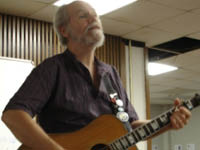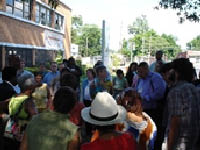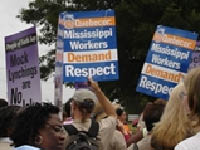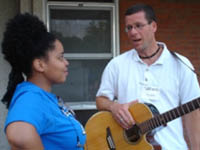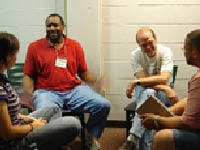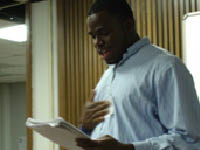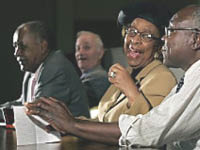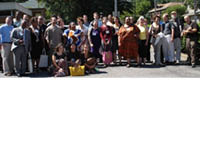2006 MEMPHIS
The focus of the Memphis School was “Faith and Labor,” and we remained anchored in the history of the Sanitation Workers strike of 1968, during which Martin Luther King Jr. was killed.
Through Bible Studies and Courses, a diverse group of faculty taught, inspired, and challenged us on themes of race, class, gender, money, work, and community.
As part of the Southern Faith, Labor, and Community Alliance Conference, the week culminated with an action at the Quebecor plant (one of several non-unionized plants operated by the second largest printing company in the world) just across the state line in Mississippi, where low-income workers (predominately African American) have been harassed for trying to organize a union to obtain better pay and safer working conditions.
This year the School had two additional parts which were co-sponsored by the Benjamin Hooks Institute for Social Change: a midweek, day-long academic symposium on labor and globalization; and a weekend conference focusing on building ties between Black churches and the trade union movement.
Overall some 200 persons attended these overlapping events during the week, including more than 40 young adults. Two thirds of the participants were from the Southeast, 60% were persons of color, and a dozen trade unions were represented from both the AFL-CIO and Change to Win labor federations.
Components:
Through Bible Studies and Courses, a diverse group of faculty taught, inspired, and challenged us on themes of race, class, gender, money, work, and community.
As part of the Southern Faith, Labor, and Community Alliance Conference, the week culminated with an action at the Quebecor plant (one of several non-unionized plants operated by the second largest printing company in the world) just across the state line in Mississippi, where low-income workers (predominately African American) have been harassed for trying to organize a union to obtain better pay and safer working conditions.
This year the School had two additional parts which were co-sponsored by the Benjamin Hooks Institute for Social Change: a midweek, day-long academic symposium on labor and globalization; and a weekend conference focusing on building ties between Black churches and the trade union movement.
Overall some 200 persons attended these overlapping events during the week, including more than 40 young adults. Two thirds of the participants were from the Southeast, 60% were persons of color, and a dozen trade unions were represented from both the AFL-CIO and Change to Win labor federations.
Components:
- Memphis Courses and Faculty
- Memphis Site Visits and Plenary Sessions
- Worship and Prayer
- Music, Poetry, and Celebration
MEMPHIS COURSES AND FACULTY
Following is a list of the Memphis Word and World faculty and classes offered:
Bible Studies:
Bible Studies:
The Passion of Labor: Charlie King
An Intoduction to Sabbath Economics: Ched Myers and Barbara Holmes
Jesus, Work, and Wealth: Rebekah Jordan and Pete Gathje
A Womanist Theological Look at Labor: Ingeri Camara
Doing the Right and the Good: Surveying Jewish Tradition: Rabbi Aaron Rubinstein
Formation of Church as Beloved Community: Nelson Johnson and Gail Nelson
Labor, Immigration, and Faith-Based Organizing: Alexia Salvatierra and Judy Esber
Afternoon Courses:
Engaging Seminaries in Worker Justice: Joy Heine and James Luvene
The Prison Industrial Complex and Prison Labor: Harmon Wray and Gail Tyree with Laura Magnani
The Farmworker Movement: Lori Khamala and Antonio Vasquez
White People as Allies to People of Color: Jim Perkinson and Lily Mendoza
Community Unionism: Nelson Johnson and J.Herbert Nelson
Workers Centers: Jose Oliva and Charese Jordan
MEMPHIS SITE VISITS AND PLENARY SESSIONS
Site visits around Memphis included the National Civil Rights Museum, the former Lorraine Motel where Dr. King was assassinated; the Matthew R. Davis Community Center in the New Chicago neighborhood of north Memphis, which still suffers from the closing of a Firestone Tire plant years ago; and the local American Federation of State, County and Municipal Employees office, the union that eventually represented the Sanitation Workers in 1968.
In various panels we learned about current living wage campaigns in Memphis and elsewhere; examined the ongoing injustices stemming from the aftermath of Hurricane Katrina in New Orleans; and heard from veterans of the 1968 sanitation workers strike.
In various panels we learned about current living wage campaigns in Memphis and elsewhere; examined the ongoing injustices stemming from the aftermath of Hurricane Katrina in New Orleans; and heard from veterans of the 1968 sanitation workers strike.
WORSHIP AND PRAYER
We heard powerful preaching from Alexia Salvatierra and J. Herbert Nelson as well as Nelson Johnson and John Mendez from North Carolina. In the closing worship service an “altar call to commitment” inaugurated a Southern Faith, Community and Labor Alliance . We hope this network will help promote and deepen collaboration between people of faith and struggles for economic and labor justice throughout the Southeast and beyond.
MUSIC, POETRY, AND CELEBRATION
Musicians Ange Smith and Charlie King and poets Jim Perkinson and Tiffany Gray highlighted the many cultural contributions. At the Labor Expressions night, Charlie King performed and Eric Brown read poetry.

